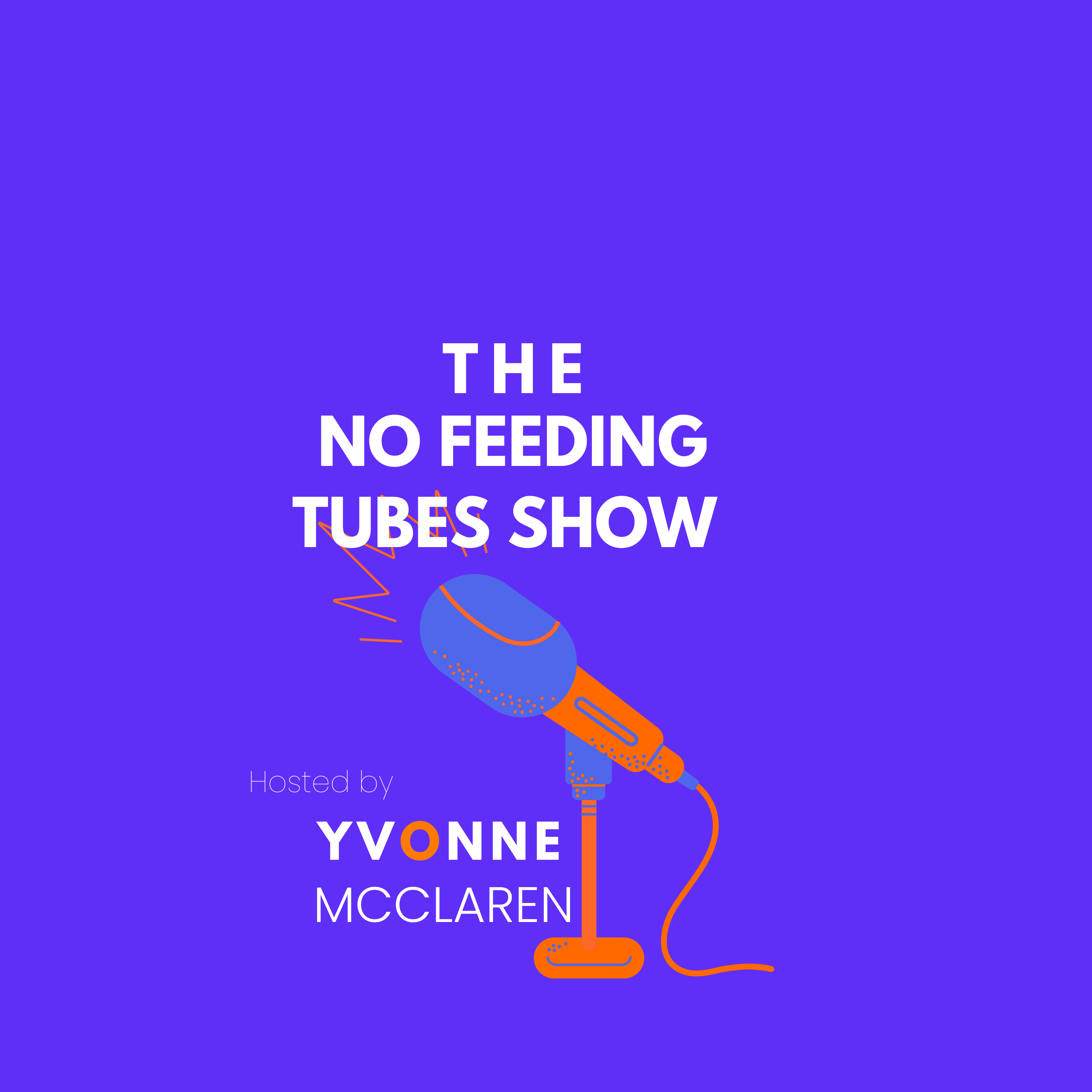Discover GAG | eating life with head & neck cancer Ep 60 - 120
GAG | eating life with head & neck cancer Ep 60 - 120

73 Episodes
Reverse
There's a a full transcript available. This episode I talk about my reason for being and why I create these resources for you.Here are the links I refer to during the podcast:Gumroad Resources Check out the latest E guide and the Mind Food Body ProgramRota Vicentina Travel - Ricardo This is a public episode. If you’d like to discuss this with other subscribers or get access to bonus episodes, visit yvonnemcclaren.substack.com/subscribe This is a public episode. If you’d like to discuss this with other subscribers or get access to bonus episodes, visit yvonnemcclaren.substack.com/subscribe
This is a public episode. If you’d like to discuss this with other subscribers or get access to bonus episodes, visit yvonnemcclaren.substack.com/subscribe This is a public episode. If you’d like to discuss this with other subscribers or get access to bonus episodes, visit yvonnemcclaren.substack.com/subscribe
The air changes in the lead up to Christmas. That smell, just before Christmas arrives, Christmas morning, something special in Australia it’s dry heat, the dark dawn brings soft strains of black bird call & magpie warble. GAG.| Eating life. is a reader-supported publication. To receive new posts and support my work, consider becoming a free or paid subscriber.Perhaps for you it’s burning cold, padded snow & food dread. Christmas lunch a task to be completed like a dental check up, getting through it and a sigh of relief when it’s all done for another year. That’s the reality for many, it’s not about tension within family units, or who did or said what last year, it’s about the focus of the day, the focus of food and drink and the importance placed on this simple activity that is lost to so many of us. Christmas lunch with its matching napkins and placed bon bons. Bowls of snacks for visitors and family you can never mindlessly eat. Inspecting food to establish what, if anything, you might be able to manage discreetly, without having to gag, spit, or conduct major mouth maintenance.Thick cut meat off roasted bone, alcohol ladened sauce that hides a burn or coughing fit. Skin on poultry a choking hazard, flutes of celebratory bubbles that lie flat, dormant not to be raised. Perhaps a soft roast vegetable swimming in sauce or gravy, maybe fruit pudding drowning in custard. Touches that make it Christmas like brandy, dried or glace fruit, spice, are lost - sometimes forever. Chatter, eating, breathing, strains of Christmas carols made hard with incessant Cisplatin ringing. Breathing simultaneous eating, spontaneity, socialising skills brought to the fore. Silver dragees our personal game of thrones, those dastardly silver balls, cracked teeth, jaw bone, choking hazard - adorned on cookies, biscuits, cakes and gingerbread houses, a game of Russian roulette for head and neck cancer sufferers.Nuts, candy, lollies, licorice, spice, nutmeg, cinnamon, bread, rolls, cake, alcohol, icing, ham, pork, chicken, beef, potatoes, pudding, chocolate, coconut - shall I go on? Christmas. Then there’s Marjorie’s husband Ray and thousands like him, who feed through a PEG. Not having to worry about Christmas eating, it’s not happening for them. Spiced mead, eggnog, cold beer, beading French Champagne, it doesn’t matter. You can’t taste it through a PEG, is it even Christmas? It’s a solitary life and experience and one that’s very hard to explain, and equally hard to endure. But endure we do, year after year and the “eating Christmas” becomes an annual chapter in the life after - literally. We just do our best. Wherever you are in the world, you might be eating curry, coconut, fish, chicken, turkey, salad, prawns on a barbecue, salami, weber food, cold sandwiches - it doesn’t much matter, if you are lucky, you are sharing that time with family, friends and people who understand your situation. Head and neck cancer treatment whether we eat orally or not affects everyone, the care givers, the PEG users, friends, strangers, the patients themselves.It is often a time of dread, a time that simply amplifies the lack of the ability to eat, swallow, to participate in something that is a simple life pleasure. It never gets easier, it never lets up, it simply becomes another thing to manage in the after math of head and neck cancer treatment. Christmas, in all it’s celebration and meaning, a large part of it is eating with family, friends and loved ones. Take a moment to reflect on your eating ability and what it means, and for people like Marjorie’s husband, perhaps the Christmas spirit is more about love, about the human spirit, about being kind and knowing that everyone is going through something you know absolutely nothing about. Perhaps it is less about the food and more about the grievances in the world and our hope for world peace. Wherever you are reading this, I wish for you a Merry, safe, and loving Christmas, oh and Ray a special Merry Christmas to you. 🎄Eat Well. GAG.| Eating life. is a reader-supported publication. To receive new posts and support my work, consider becoming a free or paid subscriber. This is a public episode. If you’d like to discuss this with other subscribers or get access to bonus episodes, visit yvonnemcclaren.substack.com/subscribe This is a public episode. If you’d like to discuss this with other subscribers or get access to bonus episodes, visit yvonnemcclaren.substack.com/subscribe
I promise you links within and here they are my lovelies …Mind Food Body Program E Guide to living your best food life Kelly McCormick Podcast This is a public episode. If you’d like to discuss this with other subscribers or get access to bonus episodes, visit yvonnemcclaren.substack.com/subscribe This is a public episode. If you’d like to discuss this with other subscribers or get access to bonus episodes, visit yvonnemcclaren.substack.com/subscribe
This is a public episode. If you’d like to discuss this with other subscribers or get access to bonus episodes, visit yvonnemcclaren.substack.com/subscribe This is a public episode. If you’d like to discuss this with other subscribers or get access to bonus episodes, visit yvonnemcclaren.substack.com/subscribe
This is a public episode. If you’d like to discuss this with other subscribers or get access to bonus episodes, visit yvonnemcclaren.substack.com/subscribe This is a public episode. If you’d like to discuss this with other subscribers or get access to bonus episodes, visit yvonnemcclaren.substack.com/subscribe
can access the workshop information here This is a public episode. If you’d like to discuss this with other subscribers or get access to bonus episodes, visit yvonnemcclaren.substack.com/subscribe This is a public episode. If you’d like to discuss this with other subscribers or get access to bonus episodes, visit yvonnemcclaren.substack.com/subscribe
This is a public episode. If you’d like to discuss this with other subscribers or get access to bonus episodes, visit yvonnemcclaren.substack.com/subscribe This is a public episode. If you’d like to discuss this with other subscribers or get access to bonus episodes, visit yvonnemcclaren.substack.com/subscribe
In this episode of the "Gag: Eating with Head and Neck Cancer" podcast. Today, I want to delve into the importance of practicing speech and share my personal journey with speech therapy.Here’s my recorded bathroom practice that I refer to in the episode. During my cancer treatment, I found myself facing the daunting task of relearning how to speak, breathe, and eat. It was a challenging and frustrating process, but I was determined to regain my abilities. One technique that proved to be incredibly helpful was filming myself as I spoke and enunciated words.I vividly remember setting up my camera in the bathroom, feeling a bit self-conscious at first. However, I quickly realised the immense value of this practice. By watching the recordings, I was able to identify areas where my speech was unclear or where I struggled with pronunciation. It allowed me to pinpoint specific sounds or words that needed improvement. Filming myself became a regular part of my routine, and creating these podcasts and filming myself for my YouTube channel would mean spending hours analyzing the recordings, making notes, and practicing specific sounds.This practice not only helped me improve my speech, but it also boosted my confidence. Seeing tangible progress through the videos was incredibly motivating. It gave me the reassurance that I was on the right track and that my efforts were paying off.I want to emphasize that this technique may not work for everyone, but it was a game-changer for me. It allowed me to take control of my own recovery and actively engage in the process of regaining my speech abilities. So, if you're facing similar challenges, don't be afraid to explore different methods and find what works best for you.Thank you for joining me on this episode of "Gag: Eating with Head and Neck Cancer." Remember, you are not alone in your journey.Eat well This is a public episode. If you’d like to discuss this with other subscribers or get access to bonus episodes, visit yvonnemcclaren.substack.com/subscribe This is a public episode. If you’d like to discuss this with other subscribers or get access to bonus episodes, visit yvonnemcclaren.substack.com/subscribe
In this podcast episode, I discuss the business aspect of head and neck cancer treatment. I emphasise the importance of treating the treatment process like a business, with a team of professionals working together towards an end goal. I mention the different professionals involved in the treatment and the need for patients to manage their own care. I also talk about our own program, the Mind Food Body program, and the importance of research, celebrating wins, and having things in place for success. I share my own struggles and milestones in my journey and encourage self-care and continuing to eat well.You can find my community here and more about me here yvonnemcclaren.bio.link Resources to purchaseEasy Follow Easy Swallow Book This is a public episode. If you’d like to discuss this with other subscribers or get access to bonus episodes, visit yvonnemcclaren.substack.com/subscribe This is a public episode. If you’d like to discuss this with other subscribers or get access to bonus episodes, visit yvonnemcclaren.substack.com/subscribe
In this podcast episode, Yvonne discusses the concept of elevator pitches and applies it to eating socially for individuals undergoing head and neck cancer treatment. She introduces her new website at Substack, which features podcasts, posts, and a section for listeners to ask her questions. Yvonne explains the idea of elevator pitches and how to create a personalised one for communicating specific needs and challenges when dining out or engaging in social activities. She emphasises the importance of practicing the elevator pitch and encourages listeners to visit her website for more resources and to connect with the community. This is a public episode. If you’d like to discuss this with other subscribers or get access to bonus episodes, visit yvonnemcclaren.substack.com/subscribe This is a public episode. If you’d like to discuss this with other subscribers or get access to bonus episodes, visit yvonnemcclaren.substack.com/subscribe
Show NotesIn this episode of "Gag ", I will be discussing my personal experience with trismus, a side effect of head and neck cancer treatment that causes difficulty in opening your mouth wide enough to eat.I will share my journey of stretching to improve my mouth opening and discuss the pain and challenges associated with trismus.It is important to persevere with the stretching exercises and maintain flexibility & to continue with daily activities such as chewing and swallowing. I cannot stress enough the benefits of maintaining good mouth opening for dental appointments and hygiene. If you want to learn more about trismus and related topics, be sure to check out my blog and bio link for additional information and resources. This is a public episode. If you’d like to discuss this with other subscribers or get access to bonus episodes, visit yvonnemcclaren.substack.com/subscribe This is a public episode. If you’d like to discuss this with other subscribers or get access to bonus episodes, visit yvonnemcclaren.substack.com/subscribe
In this podcast episode, I want to share my personal experience with head and neck cancer treatment and discuss the power of optimism and resilience. I recently wrote an article called "Dolphins Laughter and Resilience," where I talk about how I chose to react differently when I received news that my treatment had not worked as well as expected. It was a challenging time, but I realized the importance of being mindful and finding what is truly important to me in difficult situations.One piece of advice I have is to avoid seeking validation on social media. It's easy to get caught up in comparing ourselves to others or seeking approval from strangers, but it's not a healthy or productive mindset. Instead, I encourage you to be selective about the information you consume and focus on surrounding yourself with positive influences.I also want to mention my website, where I have a new "Ask Yvonne" feature. I answer questions about life after cancer treatment and provide support and guidance to those who may be going through a similar journey. It's a way for me to give back and help others navigate the challenges that come with cancer survivorship.In conclusion, I want to remind you that you have the power to choose your reactions. Life may throw unexpected curveballs, but by cultivating optimism and resilience, you can overcome any obstacle. Surround yourself with positivity, be mindful of what you consume, and remember to prioritize what truly matters to you. This is a public episode. If you’d like to discuss this with other subscribers or get access to bonus episodes, visit yvonnemcclaren.substack.com/subscribe This is a public episode. If you’d like to discuss this with other subscribers or get access to bonus episodes, visit yvonnemcclaren.substack.com/subscribe
As someone who has gone through the experience of having a PEG tube and using commercial formulas for feeding, I am compelled to share my story on this episode of "GAG | Eating with Head and Neck Cancer Treatment" podcast. I know firsthand the mental and emotional challenges that come with having a feeding tube, and I want to offer some insights and practical tips for those who may be going through a similar experience.First and foremost, it is important to accept the peg tube as a means to an end. While it may be difficult to come to terms with the fact that you cannot eat normally, it is crucial to remember that the tube is there to help you get the nutrition you need to heal and recover. It is also important to remember that the tube is potentially temporary, and that there is a plan in place to transition back to oral eating.One of the things I found most challenging about using commercial formulas for feeding was the lack of variety and freshness in my diet. While these formulas are designed to provide all the necessary nutrients, they can be bland and unappetizing. I found that incorporating fresh foods into my diet, even in small amounts, made a big difference in my overall well-being and mental health.Another important aspect of using a peg tube is having a plan to transition off of it and back to oral eating. This can be a daunting task, but it is important to have a clear pathway in place to achieve this goal. For me, this involved gradually introducing small amounts of food back into my diet, and slowly increasing the amount over time.Overall, my experience with having a peg tube and using commercial formulas for feeding was challenging, but ultimately a necessary part of my recovery. I hope that by sharing my story and offering some practical tips, I can help others going through a similar experience.You can find my community here and more about me here yvonnemcclaren.bio.link Resources to purchase - the good stuff Easy Follow Easy Swallow Book - How I did it This is a public episode. If you’d like to discuss this with other subscribers or get access to bonus episodes, visit yvonnemcclaren.substack.com/subscribe This is a public episode. If you’d like to discuss this with other subscribers or get access to bonus episodes, visit yvonnemcclaren.substack.com/subscribe
In episode 60 of the "Gag. eating with head & neck cancer" podcast, I discussed the challenges of communicating food to head and neck cancer patients. As someone who has personally undergone head and neck cancer treatment, I understand the difficulties that come with the process of transitioning from a peg tube to oral eating. In the episode, I emphasised the importance of resources, nutrition, and transitional foods for patients.During my own journey, I created a program to document my experience and help others with the mental and physical challenges of transitioning from a peg tube to oral eating. I found that effective communication, emotional support, and understanding the patient's mental state during the process were crucial to success. I encourage healthcare professionals to consider individual dietary requirements and provide patients with necessary education to make their own meals at home.In addition, I stressed the importance of emotional support throughout the process. Patients may feel frustrated, overwhelmed, or even scared during this transition, and it's important for healthcare professionals to understand and address these feelings. By providing patients with the necessary resources and support, we can help them feel more confident and comfortable with the process.Overall, my experience has taught me that effective communication, emotional support, and understanding the patient's mental state are key to helping head and neck cancer patients transition from a peg tube to oral eating. By providing patients with the necessary resources and support, we can help them feel more confident and comfortable with the process. Starting your best food life starts early in the treatment process. How we communicate and the vocabulary used is so important.You can find my community here and more about me here yvonnemcclaren.bio.link Resources to purchase Easy Follow Easy Swallow Book yvonnemcclaren.bio.link This is a public episode. If you’d like to discuss this with other subscribers or get access to bonus episodes, visit yvonnemcclaren.substack.com/subscribe This is a public episode. If you’d like to discuss this with other subscribers or get access to bonus episodes, visit yvonnemcclaren.substack.com/subscribe
In this episode of "The No Feeding Tube Show," I discuss the importance of nutrition for patients undergoing head and neck cancer treatment. I share my personal experience of having a peg tube for 15 months and transitioning back to oral eating, highlighting the challenges of interpreting medical advice about high protein, high energy, and nutrient-dense food when dealing with changes in the mouth, tongue, and teeth. I stress the need for patients to understand basic nutrition and food groups, and to consider their ethnicity, interests, and passions when communicating nutrition. Additionally, I provide practical tips for shopping for food and avoiding waste.You can find my community here and more about me here yvonnemcclaren.bio.link Resources to purchase Easy Follow Easy Swallow Book This is a public episode. If you’d like to discuss this with other subscribers or get access to bonus episodes, visit yvonnemcclaren.substack.com/subscribe
You can find my community here and more about the following below: -Mind Food Body Programme yvonnemcclaren.bio.link As someone who has gone through the treatment process, I can say that food plays an incredibly important role in our lives. It's not just about nourishing our bodies, but it's also about our social abilities and our ability to reintegrate back into society. Being able to get back to work, travel, and enjoy life again is a huge part of the treatment process, and food is a critical component of that.I feel like sometimes the importance of food gets overlooked in the scientific, disease-focused approach to treatment. It's easy to get caught up in the medical side of things and forget about the patient's experience. But for me, food was a lifeline during my recovery. It gave me something to look forward to, something to enjoy, and something to share with others.That's why I think it's so important to arm people with the knowledge and skills they need to make healthy, nourishing food at home. It's not enough to just tell people what to eat; we need to show them how to do it. By providing food education and resources, we can empower people to take control of their health and wellbeing, and ultimately improve their quality of life. This is a public episode. If you’d like to discuss this with other subscribers or get access to bonus episodes, visit yvonnemcclaren.substack.com/subscribe This is a public episode. If you’d like to discuss this with other subscribers or get access to bonus episodes, visit yvonnemcclaren.substack.com/subscribe
In this episode of "The No Feeding Tube Show," I discuss the emotional and social impact of head and neck cancer treatment, specifically the feeling of loneliness that can arise after treatment ends. The lifeline that head and neck cancer nurses provide. I share my personal experience and emphasise the importance of recognising and addressing this aspect of the patient experience. I also highlight the role of social media in connecting with others who have gone through similar experiences and the importance of creating a positive food experience during and after treatment. As I reflect on my experience of going from being the centre of attention to feeling like I was nothing, I realize that it was a significant turning point in my life. It was a time of great change and adjustment, and it affected every aspect of my life.Physically, I had to learn how to navigate through my daily routine without the constant attention and validation that I was used to receiving.I had to learn how to do things for myself and not rely on others to do them for me. It was a challenging process, but it helped me become more independent and self-sufficient.Mentally, I had to retrain my thought process to not constantly seek out approval from others and to find confidence within myself. I had to learn how to be comfortable in my own skin and not rely on others to validate my food worth.It was a difficult process, but it helped me become more self-assured and confident. It was and continues to be a pathway of constant learning.Emotionally, it was a rollercoaster ride. I went from feeling on top of the world to feeling lost and insignificant. It was a challenging time, and I had to work through a lot of difficult emotions. I had to learn how to cope with feelings of loneliness and isolation, and I had to find ways to build my self-esteem and self-worth.Overall, it took time and effort to work through those emotions and come out on the other side feeling more grounded and secure in myself.It was a challenging time after treatment was complete, but it helped me grow and become a stronger person.I invite listeners to share their own stories and experiences with loneliness after head and neck cancer treatment. You can find my community here and more about me here yvonnemcclaren.bio.link Resources to purchase Easy Follow Easy Swallow Book This is a public episode. If you’d like to discuss this with other subscribers or get access to bonus episodes, visit yvonnemcclaren.substack.com/subscribe This is a public episode. If you’d like to discuss this with other subscribers or get access to bonus episodes, visit yvonnemcclaren.substack.com/subscribe
Show NotesIn this podcast episode, I discuss the importance of the International Dysphagia Diet Standardisation Initiative (IDDSI) as a resource for people with swallowing difficulties. I share my personal experience with dysphagia and how I discovered IDDSI, expressing frustration with the lack of promotion of the resource by healthcare professionals. I note that IDDSI is person-focused and provides information that can be applied to an individual's personal eating life. I commend the volunteers and sponsors of IDDSI and encourage individuals to continue eating well and taking care of themselves.I talk about my Mind Food Body Program that includes the use of IDDSI and how it helped me transition back to oral eating. You can find my community here and more about me here yvonnemcclaren.bio.link Resources to purchase Easy Follow Easy Swallow Book This is a public episode. If you’d like to discuss this with other subscribers or get access to bonus episodes, visit yvonnemcclaren.substack.com/subscribe This is a public episode. If you’d like to discuss this with other subscribers or get access to bonus episodes, visit yvonnemcclaren.substack.com/subscribe
If you or a loved one has gone through head and neck cancer treatment, you know firsthand the challenges of managing eating and swallowing difficulties. As someone who has personally experienced these idiosyncrasies, I want to share my story and offer advice for coping with them.One of the most important things I've learned is the impact of external factors on swallowing. Changes in weather, exercise, and mental health can all affect our ability to swallow. By being mindful of these factors, we can better manage our swallowing difficulties and reduce frustration.Another valuable insight I've gained is the importance of communication and advocacy. I've struggled with communicating my specific needs to service staff in restaurants, but I've found that mentioning my head and neck cancer diagnosis can increase understanding and support. By advocating for ourselves and educating others, we can improve our overall quality of life.I also want to introduce my new (soon to be launched) platform, GAG | eating for head and neck cancer, as a valuable resource for patients, caregivers, and medical practitioners.This community allows us to learn from lived experience and improve our ability to manage eating and swallowing after treatment. By sharing our stories and strategies, we can find support from others who understand our struggles.In conclusion, I hope this episode has offered you insights and resources for coping with swallowing difficulties after head and neck cancer treatment. Remember to practice self-care, advocate for yourself, and seek support from others. We can improve our quality of life and find hope for the future.Thank you for listening,YvonneYou can find my facebook community Every thing Yvonne here yvonnemcclaren.bio.linkInstagram Resources to purchase Easy Follow Easy Swallow Book This is a public episode. If you’d like to discuss this with other subscribers or get access to bonus episodes, visit yvonnemcclaren.substack.com/subscribe
























